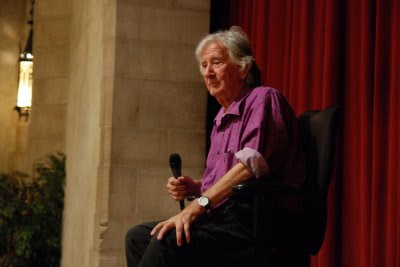The Obama phenomenon is a hoax carefully crafted by the captains of the New World Order. He is being pushed as savior in an attempt to con the American people into accepting global slavery.
Last night I watched some of it with this blog post in mind and a critical eye at the ready. My thoughts congealed around the idea that power for 99% of the population is as distant as the moon. Conspiracy (and I will explain what I mean by that) is one way of bringing the conception of power closer to the mundaneness of daily life. To explain how I came to this idea I go back to the Goombungee school bus in the hot summer of 1983. The Australian government had just changed and after 8 years of centre-right leadership the adults who could had just voted in a Labour government led by Robert (Bob) Hawke, then holder of the beer sculling world record, a yard glass - approximately 3 imperial pints or 1.7 litres - in eleven seconds.
On my school bus sat several teenagers from religious families. I remember one of these kids speaking at length about Hawke "being pushed as savior in an attempt to con the
Later in my life, in 1994 I attended a lecture at Sydney University by Noam Chomsky (who no doubt is part of the same conspiracy as Bob Hawke but we on the Goombungee bus did not get much exposure to the anarchist linguist so he was never in the story). I remember Chomsky touched on the idea of conspiracy theories in his presentation. He said that conspiracy theories are dependent on distance; if it is an enemy state it is not a conspiracy, it is intelligence (think Weapons of Mass Destruction in Iraq, the famine that has been going on in North Korea for a decade and so on). If the theory under consideration is closer to 'home' and involves one's own government then we are talking conspiracy.
In the decade and a half since I saw Chomsky speak, power has drifted even further away from the masses in many lands. With jobs moving to the new industrial economies of the East and governments moving upwards into a level of global blocs (NAFTA, EU, ASEAN and so on) the average citizen can be forgiven for feeling there is more to the story of government than what they are being told. The concept of politic agency at the individual level is not strong and healthy at the moment in many nations. It is here that the conspiracy enters into the fabric of political narrative. Conspiracy, such as The Obama Deception brings power closer to people via narrative and thereby provides a sense of mythic agency in relation to politics.
The tragedy of media such as The Obama Deception is not the possible degrees of truth value that can be related to it as a text. Rather, that political agency is translated into complex narratives and enacted out along reactionary lines of behaviour as a part of the political process (it has had 2.5 million views on just one of its YouTube sites) I find very disturbing. The more time people spend putting together the pieces of The Obama Deception puzzle (even if it is just in their minds) the less time is being spent on actually doing something to participate in the democratic political process. Of course the people behind The Obama Deception would say that there is no democratic process today. That's the way they want it. The result of such a narrative as The Obama Deception and "the man with the name of a wild bird" from 1983 is a negation of what few democratic rights we have remaining.




